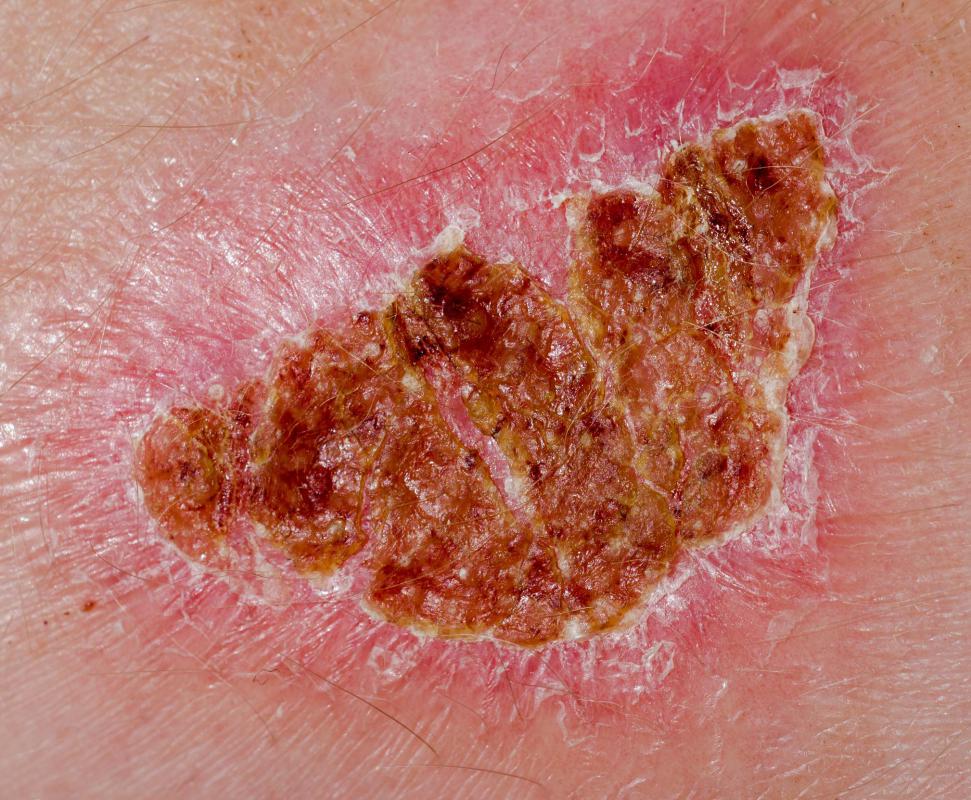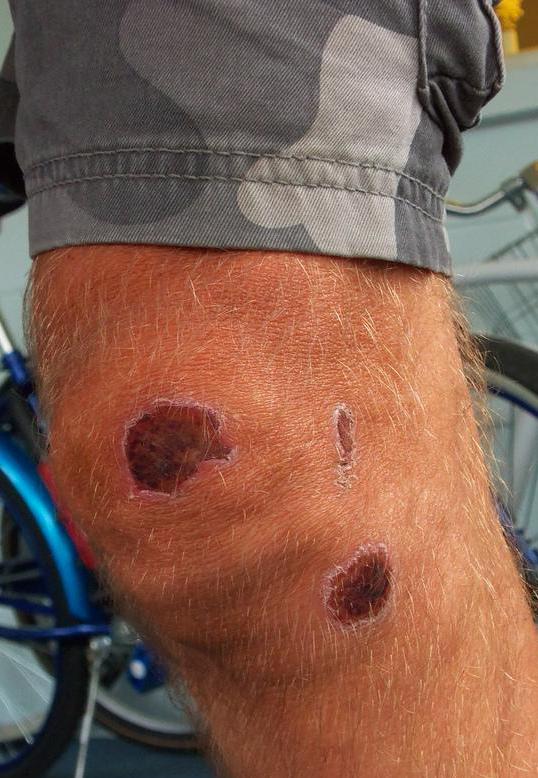At TheHealthBoard, we're committed to delivering accurate, trustworthy information. Our expert-authored content is rigorously fact-checked and sourced from credible authorities. Discover how we uphold the highest standards in providing you with reliable knowledge.
What are the Stages of Wound Healing?
There are four stages of wound healing. In order, the stages are inflammation, epitheliazation, angiogenesis, and remodeling. It can take as little as three weeks or as long as two years for a wound to finish the healing process, depending on its severity. Some wounds disappear almost completely once they are healed, while others might leave a very noticeable scar that may never go away. No matter how severe the wound was, the tissue covering it is usually not as strong as it originally was when it grows back.
The inflammatory stage, which is the first of the four stages of wound healing, might last from two to five days. During this time, the wound begins to heal itself from the inside and the body starts to repair any affected tissues. A person might notice that the wound is bleeding, and blood clots will typically begin to form at its surface. Blood vessels attempt to narrow themselves to reduce the amount of blood that comes out. A scab will usually begin to form over the open area, and this is when the epitheliazation stage generally begins.

During the epitheliation stage, the second of the stages of wound healing, the scab has formed over the outside of the wound and new skin has started to grow underneath. This stage might last as long as a few days or a few weeks. The outer edges of the wound in the skin start to constrict, growing closer together and finally binding as the new skin develops and holds the edges together. As epitheliation comes to an end, angiogenesis begins and new blood vessels begin forming underneath the new skin to replace the ones that were injured.

The last of the stages of wound healing is known as remodeling. When this occurs, the scab covering the wound has likely either come off completely or has started to flake off. Collagen begins to form rapidly, and a scar will start to become noticeable. The scar tissue present may help to protect the site of the wound more effectively than the scab did, but the tissue is still not normally quite as strong as the tissue it replaced. Once the scar has formed, the wound has typically finished healing, and the scar may never completely go away. Even though the stages of wound healing are normally the same for almost everyone, the rate at which wounds heal still tends to vary depending on the severity of the wound and the particular person because not everyone heals at the same rate.
AS FEATURED ON:
AS FEATURED ON:
















Discussion Comments
Do I have to bandage a wound after a scab forms?
I've had quite a few scabs in my life. Right now I have fourteen on myself, this so is evident that I am accident prone. My most recent one is from crashing into a palm tree on a 20 mph bicycle and I have it on my left leg and hand. God help me.
I had a cut on my penis from shaving. After a month the skin still looked white, but didn't sting when I shower. Would you all say it was healed?
I had one cystic acne thing and I kept trying to pop it with my fingers (I know, not a good idea) but it worked before so I just did it. The skin on the top is now healing, but I can kind of see through it and something under it or the skin on top is white and it hurts when I touch the top of the wound, but not around it. Is it infected? If it is, how do I drain it at home? I really don't want to go to the doctor and I don't even think my parents would take me. My forehead kind of aches because of it.
I don't know how to say this, but I had a pimple scar on my face. I used foundation to cover it.
Sweat and dust clogged the pores and a new pimple formed. I applied benzoyl peroxide overnight (after I squeezed it), only to discover that it has become red and now it is hurting a lot.
My face looks so marked now, it will take more than three months to heal. Now what do I do? Why did I do this? I shouldn't have applied makeup to hide the scar, in the first place. My bad.
As a child, I had the overwhelming urge to pick at my scabs. My mother always told me not to do this, because once a wound had scabbed over, it had reached a stage of healing.
She said that the intense itching I felt in the area was a sign that my body was fixing the wound. She told me that I didn't need to interfere by scratching, and if I did, it would only make the wound take longer to heal.
I tried to resist, but usually, the itching was so severe that I caved. I know that I prolonged the healing process, but it just felt so good to get some relief!
Wounds that get infected and have to be dug into take quite awhile to heal. My husband was bitten by a poisonous spider, and his flesh had started to rot in that area.
When the doctor saw it, she lanced it and started squeezing pus out. It was so deep that she had to scoop several inches down to get it all.
After she had cleaned it out, she applied some wound dressing. She stuffed gauze deep down into the wound and told him to come back in a few days to have it redressed.
He said that it nauseated him when he came back and she started pulling long strips of gauze out of his wound. I think that this wound took over a year to fully heal.
@OeKc05 – It sounds like you had an extended wound healing stage for your head injury. When something strong and sharp jabs into your skin, it takes a lot of time and effort on the part of your body to heal the ruptured area.
I have a spot on my leg that is still missing a chunk of flesh from the time that I ran into the edge of a brick step. It rammed into my shin, which is one of the most painful parts of the body to hit.
I had the blackest, nastiest bruise for the longest time! It went through several bright colors before the area around it returned to a normal skin tone, but the spot where the flesh had to regrow was much whiter than the surrounding region.
Even decades later, the spot is lighter than the rest of my skin. I also have an indentation there.
I am pretty accident prone, so I have gone through the wound healing process more times than most people, I would imagine. Luckily, only a couple of wounds have been severe enough to have left scars, though.
I still have a deep scar leading down from the outer edge of my left eyebrow from the time that I literally ran into my dad's truck with my head. I was six years old, and I was running to get the basketball. I misjudged the distance between myself and his truck, and I rammed my head into the sharp edge of the bumper.
I had a black eye for awhile, and the wound required stitches, because the front of my shirt was covered in blood. It took months for it to heal, and twenty-seven years later, I still have the scar to show for it.
@turkay1, @anamur-- Some people's skin tissue is just more inclined to scarring. This doesn't mean that your wounds aren't healing properly.
If your body had trouble healing wounds, you would be dealing with chronic wounds. Healing would never take place and the wounds would remain open and infected.
The fact that your body is able to create a scab over the wound, heal it and restructure the tissue without infections means phases of wound healing takes place just fine.
@turkay1-- We learned about the stages of healing in class recently. Actually, scarring is a normal part of the healing process. While the skin tissue is restructuring itself and creating more collagen, scarring naturally takes place. So that is not odd.
But later on, in the end stage of wound healing, the scar is supposed to be remodeled which not only improves the appearance of the tissue but also makes it thicker and stronger.
It's possible that your body is not doing the remodeling very well. For serious wounds that take very long to heal, some scarring is probably inevitable. But you can tell your doctor about minor wounds also leaving scars.
There are creams and special bandages that help the tissue remodel itself after the wound has healed. I've heard that moist wound healing bandages work really well for example. Using these products might be beneficial for you.
I've noticed that I'm almost always left with a scar after my wounds heal. It doesn't matter if it's a less serious wound that heals quickly or a more serious one that takes days and weeks, there is always a scar.
I feel like as years pass, I'm collecting more and more scar marks on my skin and it looks bad. I have several scars from burns, several from warts I had as a child. I also have numerous scars from small cuts and scratches my cat is responsible for.
Why do I always get scars? Is there something not going right in the remodeling stage of my wound healing process that's causing this? Is there a way I can help my body heal without resulting in scars?
Post your comments